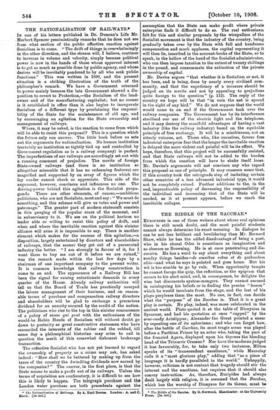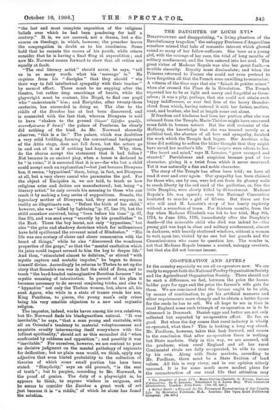THE RIDDLE OF THE BACCHAE.*
EURIPIDES is one of those writers about whose real opinions there is still much doubt, and the most painful students cannot always determine his exact meaning. In dialogue he can be not less brilliant and bewildering than Mr. Bernard Shaw, while he has the added disadvantage of being a poet, who in his choral Odes is sometimes as imaginative and as obscure as Browning. He is at once penetrating and dis- cursive. He has a word to say about everything and about sundry things besides—de omnibus rebus et de quibusdam aliis—and what he says is pointed and goes home. But his wit is too nimble to go by rule. When opportunity tempts he cannot forego the quip, the reflection, or the epigram that occurs to his alert mind, and, in consequence, he delights the wise but disconcerts system-mongers. They cannot succeed in cataloguing his beliefs or in finding the precise " lesson" which he would inculcate from the stage, and the last of his plays perplexes them the most. No one, in fact, can decide what the "purpose" of the Bacchae is. That it is a great play is certain. No play, indeed, was more celebrated in the ancient world. Plato quoted it at the table of Dionysius in Syracuse, and had his quotation at once " capped" by the ever-ready Aristippus ; Alexander the Great pointed a sneer by repeating one of its aphorisms ; and who can forget bow, after the battle of Carrhae, its most tragic scene was played before a Parthiau Prince by an actor who, taking the part of the frenzied Agave, displayed upon his thyrsus the bleeding bead of the Triumvir Crassus ? Nor have the moderns judged it less favourably, for, to take only two instances, Milton speaks of its " transcendent excellence," while Macaulay calls it a "most glorious play," adding that "as a piece of language it is hardly paralleled in the world." Unhappily, however, criticism is not content that tragedy should stir the interest and the emotions, but requires that it should also convey instruction. As, therefore, Euripides had always dealt largely with religion, it is assumed that the Bacchae, which has the worship of Dionysus for its theme, must be • The Biddle of the Bucher. By 0. Norwood. Manchester : at the University Press. [5s. net.]
"the last and most complete exposition of the religious beliefs over which he had been pondering for half a century." It is, we are assured, not a drama, but a dis- course on theology, in which, however, the preacher leaves the congregation in doubt as to his conclusion. Some hold that he recants the errors of his youth, while others consider that he is having a final fling at superstition ; and now Mr. Norwood comes forward to show that all critics are equally at fault.
"The real literary artist" should never, he says, "tell us in so many words what his ' message' is." He requires from his " disciples " that they should " win their way to full intellectual sympathy with their teacher" by earnest effort. There must be no supping after the theatre, but rather deep searchings of hearts, while the playwright must be content, like Hegel, to find one pupil who " understands " him ; and Euripides, after twenty-three centuries, has succeeded in doing so. The clue to the riddle of the Bacchae has at last been discovered, and is connected with the fact that, whereas Dionysus is said to have "shaken to the ground (8c'epar' Illeneev xaliaCe, ovvreepcivorrat 8' ircw)" the palace of Pentheus, he clearly did nothing of the kind. As Mr. Norwood shrewdly observes, "this is a lie." The palace, which was doubtless a very solid building, forming the conventional background of the Attic stage, does not fall down, but the actors go in and out of it as if nothing had happened. Why, then, do the chorus accept the statement that it had fallen ? Not because in an ancient play, when a house is declared to be " in ruins," it is assumed that it is so—for who but a child could accept such an explanation ?—but just because Dionysus has, it seems, "hypnotised" them, being, in fact, not Dionysus at all, but a very clever rascal who personates the god. For the object of Euripides is, we are told, to teach us how religions arise and deities are manufactured; but, being "a literary artist," he only reveals his meaning to those who can reach it by making a long series of suppositions. Semele, the legendary mother of Dionysus, had, they must suppose, in reality an illegitimate son. " Before the birth of her child," however, she was " killed by lightning "(p. 87, line 28), but the child somehow survived, being "born before his time" (p. 87, line 33), and was sent away " secretly by his grandfather " to the East. There the boy learnt, not only "hypnotism," but also "the grim and shadowy doctrines which for millenniums have held spellbound the reverent mind of Hindostan." "His life was one ecstasy of closer and closer communion with the heart of things," while he also "discovered the wondrous properties of the grape," so that the "mental exaltation which its juice could impart seemed to him the key to deeper life." And then, " stimulated almost to delirium," or stirred " with mystic rapture and ecstatic impulse," he began to dream himself divine. Accordingly he returns to Thebes to set up the story that Semele's son was in fact the child of Zeus, and to teach " the bard-headed unimaginative Boeotian farmers " the mystic meaning of intoxication. In pursuit of his plan it becomes necessary to do several conjuring tricks, and also to " hypnotise " not only the Theban women, but, above all, his aunt Agave, who while in a state of trance rends her son, King Pentheus, to pieces, the young man's only crime being his very sensible objection to a new and orgiastic religion.
The impostor, indeed, works havoc among his own relatives, but Mr. Norwood finds his blackguardism natural. "It was inevitable," he says, "that a man young and excitable, with all an Oriental's tendency to material voluptuousness and exquisite cruelty interweaving itself everywhere with the loftiest spirituality," should act as this scoundrel did " when confronted by coldness and opposition"; and possibly it was "inevitable." For ourselves, however, we are content to pass no decisive judgment on the mental pathology of aspirants for deification; but no plain man would, we think, apply any adjective that even hinted probability to the collection of theories of which some small portion has here been stated. "Simplicity," says an old proverb, "is the seal of truth" ; but to perplex, according to Mr. Norwood, is the proof of genius. The duty of a playwright is, he appears to think, to express wisdom in enigmas, and he seems to consider the Bacchus a great work of art just because it is " a riddle," of which he alone has found the solution.















































 Previous page
Previous page